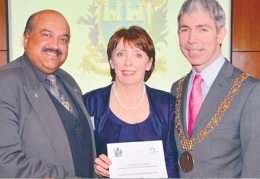The Lord Mayor of Dublin welcomed over 300 delegates from the Garda and community and social services sectors to his conference aimed at finding ways to tackle anti-social behaviour at Croke Park in the capital.
Addressing the conference, Lord Mayor Andrew Montague said his commission on anti-social behaviour had highlighted a number of key recommendations “to prevent anti-social behaviour and help offenders to change their behaviour”.
Among these, he urged Dublin City Council to introduce the HSE’s ‘Early Intervention’ parenting programmes, particularly in marginalised areas of the city.
“These programmes strengthen the bond between parents and infants in the first two years of life,” he said. “Research consistently shows that these parenting programmes offer the best value for money in diverting from a later pattern of anti-social behaviour as an adult.
“Early years programmes can have a dramatic effect on children’s development and wellbeing.”
The Lord Mayor emphasised that there “must be consequences for how the impact of anti-social behaviour affects the quality of life of communities on the ground.
“Prison can result in significant deterioration of behaviour, resulting in worse outcomes for our communities.”
Based on the work of the commission, he said the city proposes the introduction of on-the-spot fines and ‘restorative justice’ as alternatives to prison.
“Restorative justice is a valuable tool in dealing with anti-social behaviour and its use should be rolled out throughout Dublin,” he said. “It forces offenders to face up to the impact of their actions and make amends for their behaviour.”
Minister for Justice Alan Shatter welcomed the work carried out by the commission and said he looked forward to reviewing its full report and the outcome of the conference.
“I particularly welcome the emphasis on close collaboration between all of the frontline agencies and the communities they serve,” he said. “I also want to acknowledge the very good intervention, diversion and community policing work already underway, and the positive impacts this is having.”
The conference featured a number of key speakers, including Roisín Shortall, Minister of State at the Department of Health with responsibility for primary care.












